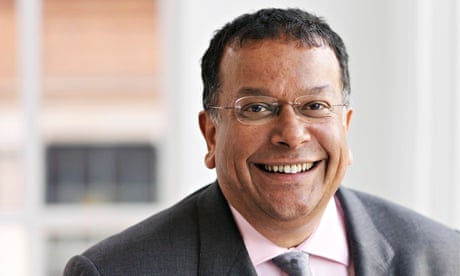"Philanthropist? I hate that word - it is very old fashioned and not where we are today," said Iqbal Wahhab.
The founder of Roast, a restaurant situated in London's Borough Market, is well-known for his "charity" work, including collaborations with the Prince's Trust and his belief that charities should be more business-like.
"I have been saying that the voluntary sector needs to change for years and stop using the F-word.
"Funding is not going to be there forever, and when it runs out it is not going to come back. The only way charities are going to survive this is if they start reforming as social enterprises and start building commercial principles into what they do.
"It is not that difficult: charity chief executives stick their head in the sand and say 'No, no, no. This is how we do things.' The smart thinking ones are recognising there is a new model that doesn't use the word fund. Instead they are using the word investment."
The Bangladeshi-born businessman told the Guardian Voluntary Sector Network that charities are not always right in what they do and businesses have many ideas that can help improve them. Wahhab explained that when he began work with the Prince's Trust, it was not keen to be "prodded".
"Some organisations do not want to jump through hoops to get your money and, amazingly, there are a large number who think they know better and would rather not be probed about their intentions and plans.
"Like many organisations, the Prince's Trust would rather just get a cheque from me. It was me who prodded them and gave a cheque with conditions on it. It disrupts their model.
"Charities should go out looking for private sector knowledge that can help them."
When looking to invest in a organisation or charity, Wahhab says he looks at whether it has clear goals, how it provides transparency and innovates. However, above all, it is down to his passion.
"I want to know I am spending my money wisely and with the right person, but every investor has their personal chart of interest and mine is around young people and prisoners, so anything around those and developing businesses go higher on my radar."
Despite being very hands on with his non-commercial activities, Wahhab explains that, when it comes to measuring impact, he tends to leave the organisations to it.
"It is important to keep track of your service users and make sure you are having that impact, but if I micro-managed each investment then I wouldn't be doing very much and would be burdening the organisation. You need to get that balance."
He says it is a businesses' prerogative to help organisations and individuals become a sustainable process and explains that when he began everyone thought he was crazy.
"Everyone said you have to wait to be profitable before you give part of your profits away. I built a business model and factored in loss from day one."
Wahhab explicitly says that doing good is good for your business. When people heard Roast was employing former offenders, it encouraged them to eat at the restaurant, too.
"If you do good, people will follow you. If by going to a restaurant and eating some nice food you are having a marginal impact, then you will want to spend more money there.
"More and more people are wanting to do this and see more stretch in their money. This is the very essence of what businesses need to be doing."
Iqbal argues that corporate social responsibility is effectively redundant and that cross-sector collaboration is a two-way street. Businesses can learn from charities too – especially when it comes to corporate social responsibility.
"CSR is often left to the nice person at the end of the corridor and, instead, the concept should be integrated into the whole business. It is not that difficult.
"It is great if you have an extra £50 or £500,000, but don't just give it away. Look at where you are spending your money anyway.
"For example, look at your paperclips and the paperclip company – what is their impact on the environment and what are they doing to diversify their workforce. It is about the supply chain as well."
For Wahhab, "businesses need to find their own values" and go from writing "blank cheques to loaded cheques".
Old-style charity. like philanthropy, starts and ends with writing a cheque, according to him. He explains that as soon as the cheque is written, your obligation is over because you have done something good.
"We don't apply those types of principles to our businesses so why should we do so to our charities."
For more updates and opinions on the challenges and opportunities facing the voluntary sector, join our network or follow us on Twitter @GdnVoluntary. If you have an idea or a suggestions don't hesitate to email us on voluntarysectornetwork@theguardian.com.





Comments (…)
Sign in or create your Guardian account to join the discussion